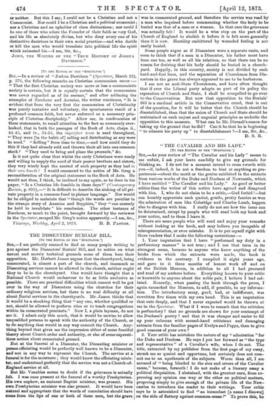THE DISSENTERS' BURIALS' BILL
[TO THE EDITOR OF THE "SPECTATOR."] SIR, —I am perfectly amazed to find so many people writing to you against the Dissenters' Burials' Bill, and to notice on what unreal and merely technical grounds some of them base their opposition. Mr. Herbert James argues that the churchyard, being consecrated, is almost a part of the church, and inasmuch as Dissenting services cannot be allowed in the church, neither ought they to be in the churchyard. One would have thought that a National Church would endeavour to be as little exclusive as possible. There are practical difficulties which cannot well be got over in the way of Dissenters using the churches for their ordinary religious services, but there is no real difficulty at all about Burial services in the churchyards. Mr. James thinks that it would be a shocking thing that "any one, whether qualified or not, should be allowed to perform rites or to teach congregations within its consecrated precincts." Now I. a plain layman, do not see it. I admit only this much, that it would be unwise to allow unqualified persons to speak with the authority of the Church, or to do anything that would in any way commit the Church. Any- thing beyond that gives me the impression either of some fanciful theory about Church order and authority, or else of some supersti- tious notion about consecrated ground.
But at the funeral of a Dissenter, the Dissenting minister or person officiating would be perfectly well known to be a Dissenter, and not in any way to represent the Church. The service at a funeral is for the mourners ; they would know the officiating minis- ter, and understand perfectly that the service was not a Church-of- England service at all.
But Mr. Venables seems to doubt if the grievance is actually felt. I was once present at the funeral of a worthy Presbyterian. His own nephew, an eminent Baptist minister, was present. His own Presbyterian minister was also present. It would have been natural and appropriate that the words of consolation should have come from the lips of one or both of these men, but the grave was in consecrated ground, and therefore the service was read by a man who inquired before commencing whether the body to be- buried was that of a man or a woman. In that case the grievance was actually felt ! It would be a wise step on the part of the Church of England to abolish it before it is felt more generally than it is now. Hostility embittered by wounded feeling is not easily healed.
Some people argue as if Dissenters were a separate caste, and• seem to think that if a man is a Dissenter, his father must have been one too, as well as all his relatives, so that there can be no- reason for desiring that his body should be buried in a church- yard. Happily, in this country, society is not divided by such hard-and-fast lines, and the separation of Churchmen from Dis- senters in the grave has always appeared to me to be barbarous.
I am not an anti-State Churchman, and have often thought that if ever the Liberal party adopts as part of its policy the separation of Church and State, I shall be compelled to go over to the Conservatives. But now that opposition to the Burials' Bill is a cardinal article in the Conservative creed, that is out of the question, for it will be better that the Church should be disestablished, than that the union of Church and State should be maintained on such unjust and ungenial principles as underlie the opposition to this measure. What can be Mr. Disraeli's reason for- taking up the ground that he did ? Can it be that he is beginning " to educate his party up " to disestablishment ?—I am, Sir, &c.,.
D. S. R.


































 Previous page
Previous page